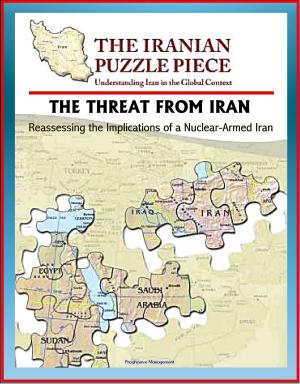The Lessons of History: The Chinese People's Liberation Army (PLA) at 75 - Tiananmen Square, Cultural Revolution, Air Force, Navy, Lessons from Korean War, Vietnam Campaign
Nonfiction, History, Asian, China| Author: | Progressive Management | ISBN: | 9781310161742 |
| Publisher: | Progressive Management | Publication: | March 12, 2014 |
| Imprint: | Smashwords Edition | Language: | English |
| Author: | Progressive Management |
| ISBN: | 9781310161742 |
| Publisher: | Progressive Management |
| Publication: | March 12, 2014 |
| Imprint: | Smashwords Edition |
| Language: | English |
The title of this volume, "The Lessons of History: The Chinese People's Liberation Army at 75," captures well the overall theme of the twelve chapters that follow. The primary focus is not on summarizing the lessons that analysts or scholars from outside China have learned when they look back at the past three-quarters of a century of Chinese military history. Rather, the emphasis of this volume is to assess key lessons that the top ranks of the People's Liberation Army (PLA) have drawn from their own military's 75-year history. The primary value of this volume, we believe, is that it provides insights into what Chinese military leaders themselves take from their past. The PLA is certainly not monolithic and to attribute a single, collective point of view is foolish, if not futile. Nevertheless, the contributors to this volume attempt to distill lessons learned by the Chinese military as an institution. However, in many cases, it is impossible to assert with 100 percent reliability what precise lessons have been gleaned by the PLA. Wherever possible, the contributors have used Chinese published source material originating from within what Paul Godwin calls "China's Defense Establishment." Moreover, it should be noted that the analyses in this volume are based entirely on open source materials.
- Introduction: The Lesson Learned by China's Soldiers * 2. China's Defense Establishment: The Hard Lessons of Incomplete Modernization * 3. PLA Ground Forces Lessons Learned: Experience and Theory * 4. PLA Air Force, 1949-2002: Overview and Lessons Learned * 5. The People's Liberation Army Navy after Half a Century: Lessons Learned in Beijing * 6. The People's Liberation Army and China's Space and Missile Development: Lessons from the Past and Prospects for the Future * 7. How Beijing Evaluates Military Campaigns: An Initial Assessment * 8. From Surprise to Stalemate: What the People's Liberation Army Learned from the Korean War — A Half-Century Later * 9. Concentrating Forces and Audacious Action: PLA Lessons from the Sino-Indian War * 10. The 1979 Chinese Campaign in Vietnam: Lessons Learned * 11. The Lessons of the 1995-1996 Taiwan Strait Crisis: Developing a New Strategy Toward the United States and Taiwan * 12. Lessons Learned from the Cultural Revolution and the Tiananmen Massacre * 13. Seventy-five Years of Civil-Military Relations: Lessons Learned
There are challenges for any outsider researching a military organization, and there are particular challenges in studying an opaque institution like the PLA.2 Since analysts are not always privy to the classified studies conducted for the internal use of the Chinese military, there is the ever-present danger of dutifully parroting the propaganda published in official works produced for public and/or foreign consumption. Often the researcher is left to read between the lines, discerning what is left unsaid or taking the logic of the official printed lesson a step further. These challenges can be partially overcome by supplementing open sources with internally circulated materials wherever possible and through interviews and firsthand observation. For the non-Chinese researcher, another challenge to be overcome in studying China's armed forces is that of mirror imaging. Many PLA analysts today have served or are serving in the militaries of their own countries and still others work in the defense intellectual communities.3 There can be a tendency to presume that all militaries think and operate more or less like one's own does. Yet, the kinds of lessons the U.S. Army may draw from a particular experience may be very different from those that might be drawn by the PLA's ground forces. Fortunately, mirror imaging is kept under control because most specialists have had to immerse themselves in Chinese language, history, and culture often for a decade or more. Many have spent months--if not years--of their professional lives in China with day-to-day interaction with the PLA.
The title of this volume, "The Lessons of History: The Chinese People's Liberation Army at 75," captures well the overall theme of the twelve chapters that follow. The primary focus is not on summarizing the lessons that analysts or scholars from outside China have learned when they look back at the past three-quarters of a century of Chinese military history. Rather, the emphasis of this volume is to assess key lessons that the top ranks of the People's Liberation Army (PLA) have drawn from their own military's 75-year history. The primary value of this volume, we believe, is that it provides insights into what Chinese military leaders themselves take from their past. The PLA is certainly not monolithic and to attribute a single, collective point of view is foolish, if not futile. Nevertheless, the contributors to this volume attempt to distill lessons learned by the Chinese military as an institution. However, in many cases, it is impossible to assert with 100 percent reliability what precise lessons have been gleaned by the PLA. Wherever possible, the contributors have used Chinese published source material originating from within what Paul Godwin calls "China's Defense Establishment." Moreover, it should be noted that the analyses in this volume are based entirely on open source materials.
- Introduction: The Lesson Learned by China's Soldiers * 2. China's Defense Establishment: The Hard Lessons of Incomplete Modernization * 3. PLA Ground Forces Lessons Learned: Experience and Theory * 4. PLA Air Force, 1949-2002: Overview and Lessons Learned * 5. The People's Liberation Army Navy after Half a Century: Lessons Learned in Beijing * 6. The People's Liberation Army and China's Space and Missile Development: Lessons from the Past and Prospects for the Future * 7. How Beijing Evaluates Military Campaigns: An Initial Assessment * 8. From Surprise to Stalemate: What the People's Liberation Army Learned from the Korean War — A Half-Century Later * 9. Concentrating Forces and Audacious Action: PLA Lessons from the Sino-Indian War * 10. The 1979 Chinese Campaign in Vietnam: Lessons Learned * 11. The Lessons of the 1995-1996 Taiwan Strait Crisis: Developing a New Strategy Toward the United States and Taiwan * 12. Lessons Learned from the Cultural Revolution and the Tiananmen Massacre * 13. Seventy-five Years of Civil-Military Relations: Lessons Learned
There are challenges for any outsider researching a military organization, and there are particular challenges in studying an opaque institution like the PLA.2 Since analysts are not always privy to the classified studies conducted for the internal use of the Chinese military, there is the ever-present danger of dutifully parroting the propaganda published in official works produced for public and/or foreign consumption. Often the researcher is left to read between the lines, discerning what is left unsaid or taking the logic of the official printed lesson a step further. These challenges can be partially overcome by supplementing open sources with internally circulated materials wherever possible and through interviews and firsthand observation. For the non-Chinese researcher, another challenge to be overcome in studying China's armed forces is that of mirror imaging. Many PLA analysts today have served or are serving in the militaries of their own countries and still others work in the defense intellectual communities.3 There can be a tendency to presume that all militaries think and operate more or less like one's own does. Yet, the kinds of lessons the U.S. Army may draw from a particular experience may be very different from those that might be drawn by the PLA's ground forces. Fortunately, mirror imaging is kept under control because most specialists have had to immerse themselves in Chinese language, history, and culture often for a decade or more. Many have spent months--if not years--of their professional lives in China with day-to-day interaction with the PLA.















